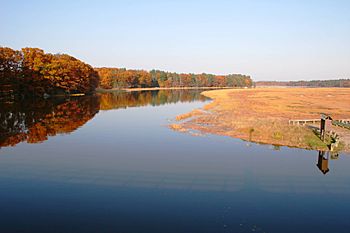Squamscott River facts for kids
Quick facts for kids Squamscott River |
|
|---|---|

Squamscott River in fall 2005 at Route 108, Newfields, NH
|
|
| Country | United States |
| State | New Hampshire |
| County | Rockingham |
| Towns | Exeter, Stratham, Newfields, Newmarket |
| Physical characteristics | |
| Main source | Exeter River Exeter 0 ft (0 m) 42°58′55″N 70°56′45″W / 42.98194°N 70.94583°W |
| River mouth | Great Bay Newmarket 0 ft (0 m) 43°3′49″N 70°54′11″W / 43.06361°N 70.90306°W |
| Length | 6 mi (10 km) |
| Basin features | |
| Tributaries |
|
The Squamscott River is a 6-mile-long (10 km) tidal river located in Rockingham County, southeastern New Hampshire, in the United States. A tidal river means its water level changes with the ocean's tides. It begins in Exeter, where it is fed by the Exeter River.
The Squamscott River flows north between the towns of Newfields and Stratham. It then empties into Great Bay, which is a large, shallow area of water connected to the ocean. Great Bay is linked to the Piscataqua River, which is a tidal inlet of the Atlantic Ocean.
Contents
Where the Squamscott River Flows
The Squamscott River starts in downtown Exeter, near the Great Bridge. As it flows, it passes by the "Wooden Wave," a unique building near the Phillips Exeter Academy boathouse. The river then moves north, flowing next to the Swasey Parkway and through grassy marshlands.
It continues its journey, passing under major roads like New Hampshire Route 101 and New Hampshire Route 108. Finally, the river flows into Great Bay. This happens just south of where the Lamprey River also enters the bay from Newmarket.
The River's Name and History
The Squamscott River has also been spelled Swampscott and Swamscott in the past. Its name comes from the Squamscott Indians, who were a Native American tribe. They called it Msquam-s-kook or Msquamskek. This name means "at the salmon place" or "big water place."
For thousands of years, Native American people lived in this region. The river and its surrounding areas provided plenty of food, including fish like salmon, game, and lush plants. These resources helped support tribes like the Abenaki. The Abenaki name means "people of the dawn" or "easterners."
In the early 17th century, English settlers arrived and began to live in the area. This led to the displacement of the Native American tribes who had lived there for a very long time.
Activities on the River
The Squamscott River is used for various activities. The Phillips Exeter Academy crew team practices on the river in Exeter. Rowing is a sport where athletes race in boats using oars.
Images for kids
-
Squamscott River in 1908, Exeter, NH
 | James Van Der Zee |
 | Alma Thomas |
 | Ellis Wilson |
 | Margaret Taylor-Burroughs |




